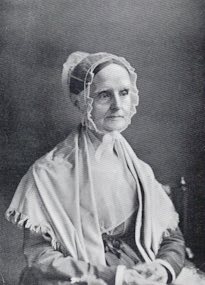The daughter of a sea captain, Lucretia Coffin spent her childhood on Nantucket Island. She was reared in the Quaker faith, unique among American religions in encouraging the equality of women.
In 1811 she married James Mott and they made their home in Philadelphia. Soon she began to speak in Quaker meetings, developing confidence and eloquence that were rare at a time when women seldom spoke in public.
In the 1830s Mott advocated the radical idea that slavery was sinful and must be abolished. She was one of several American delegates to the 1840 World’s Anti-Slavery Convention in London, but the women were denied seats. There she bonded with Elizabeth Cady Stanton whose husband was a delegate. The lesson was clear for Mott and Stanton. How could women fight for the rights of others unless they enjoyed rights of their own?
In 1848, while Mott was visiting her sister in Auburn, New York, she met with Stanton and helped to plan the first woman’s rights convention. Mott delivered the opening and closing addresses at the Seneca Falls Convention, and her husband James chaired the proceedings at the Wesleyan Chapel.
Motivated by her religious convictions, Mott dedicated herself to the twin causes of antislavery and women’s rights. She harbored runaway slaves in her Philadelphia home and agitated for Black suffrage and education when emancipation was finally won. As she wrote, spoke, and attended women’s conventions, younger feminists recognized that Mott’s early leadership had been crucial in the infancy of the women’s rights movement.

